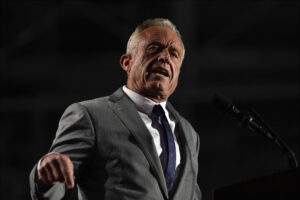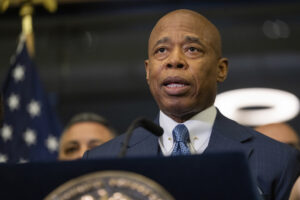Truthdigger of the Week: Mychal Denzel Smith
When a grand jury declined to indict an NYPD officer in the death of Eric Garner, The Nation Institute fellow drove past the reservations, equivocations and micro-concerns that typify polite journalism and seized the message of the day. Writer and journalist Mychal Denzel Smith. Photo by Danielle Scruggs/Mambu Badu
Writer and journalist Mychal Denzel Smith. Photo by Danielle Scruggs/Mambu Badu
Every week the Truthdig editorial staff selects a Truthdigger of the Week, a group or person worthy of recognition for speaking truth to power, breaking the story or blowing the whistle. It is not a lifetime achievement award. Rather, we’re looking for newsmakers whose actions in a given week are worth celebrating.
Mychal Denzel Smith was silent when I ran across him Wednesday evening. It was nightfall in New York, and several hundred people had gathered at the northeast end of the city’s shabby Union Square after news broke that a grand jury would not indict NYPD officer Daniel Pantaleo in the death of Staten Island resident Eric Garner. Strained cries of “Black lives matter!” and “I can’t breathe!” repeatedly rose from the crowd. The latter phrase was the last anyone heard from Garner as Pantaleo drove him to the ground outside a convenience store in mid-July in what either craven or diffident journalists are calling an “apparent” illegal chokehold. The jury’s decision came barely a week after another grand jury decided not to indict Ferguson, Mo., police officer Darren Wilson in the killing of Michael Brown — and less than two weeks after police killed 12-year-old Tamir Rice in Cleveland. Standing among friends and colleagues and almost in the street, Smith was smoldering.
A Knobler Fellow at The Nation Institute and a contributing writer at The Nation, Smith has emerged in the past two years as a critical observer of the maddening, 21st-century renewal of state-sponsored race violence in America. Materializing out of a history of segregation and oppression, the era that claimed the lives of Garner, Brown and others like them has its contemporary roots in two national events: the post-9/11 militarization of everything — including American minds — and the obliteration of African-American wealth in 2008. In less than a generation, black American life became even more desperate and insecure, and just as our government adopted policies of hostility toward anyone who vaguely resembled the inhabitants of a country that we plundered, pillaged or bombed. The consequences are visible on bloodied pavements in New York, Missouri and elsewhere, and in the anger accelerating in streets nationwide.
In an article titled “The System That Failed Eric Garner and Michael Brown Cannot Be Reformed” and published Wednesday, the day of the Garner grand jury decision, Smith assaulted the non-solutions to the problem of police violence against blacks proposed at the highest levels of government. That President Obama called for the wearing of body cameras by police officers nationwide in the same week that a jury failed to indict Pantaleo on unambiguous video evidence of his choking Garner unconscious “would seem to be hack Hollywood writing with neatly applied plot points,” Smith wrote.
“So… now what?” he asked. “We can move forward with this notion that police officers wearing body cameras will make them more judicious in their use of force, but it seems pretty clear that they just don’t give a fuck, and the court system is content to allow them to keep on not giving a fuck.” Police “are not regarded as citizens also beholden to the law. They are an armed force charged with maintenance of a status quo steeped in white supremacy and anti-blackness.”
More accountability, diversity and cultural sensitivity are the nice-sounding ideas typically offered as panaceas to the racism Smith cites. But these are unfit means for the purpose of peace between races and between the powerful and powerless. “We keep applying the language and framework of accountability, diversity and sensitivity to an issue of oppression,” he wrote. “We are attempting to fly an airplane with the keys to a motorcycle. Our tools are woefully inadequate, and until we are ready to admit to ourselves that the police are an inherently oppressive force, and then use the language of anti-oppression and anti-racism in our analysis and solutions, it will not end today.
“The dead bodies of black folks will continue to line our streets and sidewalks, and they will be treated no better than the roadkill with whom they occupy those spaces.
“We are being choked and shot with impunity,” he concluded, “and yet all that is being offered to us in response is a means to relive the experience over and over again.”
The force and urgency of Smith’s words were matched only by remarks he made during an appearance on “Democracy Now!” on Friday. The show devoted the bulk of its program to a discussion of what are fairly and accurately described as fatal policing practices. In a discussion that included New York Daily News columnist Harry Siegel and retired African-American NYPD detective Graham Weatherspoon, Smith drove past the reservations, equivocations and micro-concerns that typify polite journalism and seized the central message of the day.
“What we’re talking about here is the disposability of black life,” he said to his hosts and fellow guests, insisting that they direct themselves to the deep cultural and institutional causes of the deaths. “It’s about this perceived threat of blackness. And it’s about undoing all of that and asking ourselves why we’ve become so reliant on police in the first place.
“And this is the thing,” he continued. “We foment social decay and then say, ‘Police, go fix it.’ You know, like this is the problem here. We are over-reliant on the police. And I understand the sentiment of people living in the housing projects. I mean, I’ve talked to kids who have watched their friends die, and they’re like, ‘Well, the police aren’t doing anything, and it feels like they’re leaving it up to us to get street justice,’ right? So that then leads to retaliation and more murder. So, it would be nice if the police were solving these homicides in these black communities. But if we’re directing so much energy to patrolling, to little things like loitering, like, you know, public drunkenness [the officers who approached Garner suspected him of selling untaxed cigarettes] — so-called quality-of-life things — then we’re directing resources away from the very serious things that people actually have complaints about and trying to fix real social ills with the police instead of investment in communities.”
With this Smith comes to the question of why, in one of the most able and informed countries in the world, the age old problem of institutional violence against minorities has not been solved. Do we really lack the answers or the means of implementing them? Does the American political and legal establishment refuse to hold its members to the standards of justice it sets for everyone else because if it permitted the indictment of cops like Pantaleo, it would be indicting itself? As protesters massed in the streets last week, Attorney General Eric Holder promised an “independent, thorough, fair, and expeditious [federal civil rights] investigation” into Garner’s death, so — though many of us are justifiably confident that we have the answer to that question — officialdom will at least have the chance to right the Staten Island grand jury’s wrong.
As Smith emphasizes, the old lines about accountability, diversity and sensitivity mean nothing when leaders preserve economic and political policies that keep entire populations trapped in conditions of abject horror. For pointing out the slick substitution of nice phrases for meaningful reform and indifference to the social consequences of leaving things the way they are, he is our Truthdigger of the Week.
Hear Smith speak on “Democracy Now!”:
Your support matters…Independent journalism is under threat and overshadowed by heavily funded mainstream media.
You can help level the playing field. Become a member.
Your tax-deductible contribution keeps us digging beneath the headlines to give you thought-provoking, investigative reporting and analysis that unearths what's really happening- without compromise.
Give today to support our courageous, independent journalists.








You need to be a supporter to comment.
There are currently no responses to this article.
Be the first to respond.